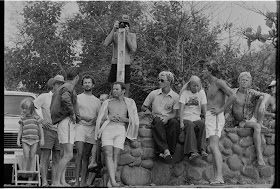[Redux addition: Although rarely mentioned these days, Mishima was a classic example of a post-WWII Japanese literary artist. His work, and his manner of life, figured prominently in my master's thesis in literature where I studied the influence of American lit on the rapidly changing Japanese culture of the post-war period, and how that American-influenced Japanese literature in turn influenced the writing of American novelists beginning in the 1950's to the present day. In order to appreciate Mishima's lyricism, I actually learned to read Japanese, after a fashion. This was originally posted on July 27, 2012.]
Recently, the youngest was visiting and decided to read my old paperback edition of
The Great Gatsby. Despite her private school and liberal arts college education, she had never read about Jimmy Gatz and his self-transformation into the mysterious millionaire of Long Island. Remarkable, given what that education cost, eh? She does, however, know that plastic is "bad" or something.
Anyway, she read the story and, when we were talking about it, she mentioned something that's been noticed by many a reader and critic. Namely, F. Scott Fitzgerald rarely wrote a bad sentence. I told her I found that to be true even in his later works, when he was surviving on a hot fudge sundae and two quarts of whiskey a day diet. I really couldn't think of any other American writer of whom the same could be said.
There was, however, a Japanese writer who had mastered the art of composition; he, too, could not write a bad sentence, although he is not always well-represented by English translators. He's pictured above in a moment of repose:
Yukio Mishima, considered by many to be the greatest Japanese writer of the 20th century.
He was, as opposed to Fitzgerald, highly disciplined in his physical life. Instead of fortifying his art with whiskey and ice cream, Mishima was a body-builder and weight-lifter. He despaired of the relative physical slightness of Japanese men of his generation, especially as compared with the American GI's who occupied post-war Tokyo, and sought to train that away through hard work in gym and dojo. By 1970, he may have been the most physically fit man of letters the world had ever known. This discipline is discerned in his artistic craft, as well, as his plays, short stories and novels are clearly the product of much careful labor and thoughtfulness, with no small portion of appreciation for the fractured and fractious beauty of the world.
He was also a little un-hinged. Did I mention that?
He died shortly after taking charge of a Japanese army headquarters building. Yes, that's right. He did that in 1970, armed only with a sword [and backed by about three or four followers] in order to lecture the assembled soldiers on the need to re-claim the pre-war values of labor, faith, and industry. Then he committed ritual suicide; the kind known as
seppuku. I'll spare you the details.
While I appreciate a "gonzo" style of life as much as the next person, I chiefly recognize Mishima for his prose, as his novels carry a beauty that is typically Japanese and cannot be produced in the same manner by any other culture. It is an art that is difficult to master and no one has surpassed Mishima in this regard. [Ironically, my Japanese students did not care for Mishima; not for literary reasons, but because they felt he was a cultural embarrassment due to the nature of his death.]
It is generally recognized that, had he lived, he would have been awarded the Nobel Prize in Literature, especially based on his final work, the manuscript for which he dropped in a mailbox on his way to his death. It was a grim surprise for his publisher a few days later. [For those wondering, the Nobel Prize is never awarded posthumously.]
Also, and as odd as this may sound coming from one of my profession, he turned his self-determined death into a form of art, too. The 21st century seems to be a time when timid artists and writers compliment one another on their "courage" and "transgressive work". Somehow, criticizing Republicans, Mid-Westerners, Southerners, Christians, gun-owners, the obese and the poor doesn't seem as courageous and transgressive as storming an army headquarters, urging an indifferent audience to claim values that had long since become alien, and then ritualizing self-slaughter in order to satisfy...well, perhaps that is best expressed in the quotation below.
"All my life I have been acutely aware of a contradiction in the very nature of my existence. For forty-five years I struggled to resolve this dilemma by writing plays and novels. The more I wrote, the more I realized mere words were not enough. So I found another form of expression. I want to make a poem of my life."
For those interested in further reading, I would direct you to the "
Yukio Mishima page" on a popular online book retailer's site. Although, if you have a local bookstore, please support them. Not only does it help to keep them in business, but it may educate 21st century bibliophiles on the staff about a neglected artist.
The Temple of the Golden Pavilion is a particular favorite of mine, as it displays to advantage the relationship between beauty and suffering that forms a strong portion of Japanese art, literature, and spirituality. There is also a handful of biographies that struggle to place his contradictory personality into some reasonable context.












